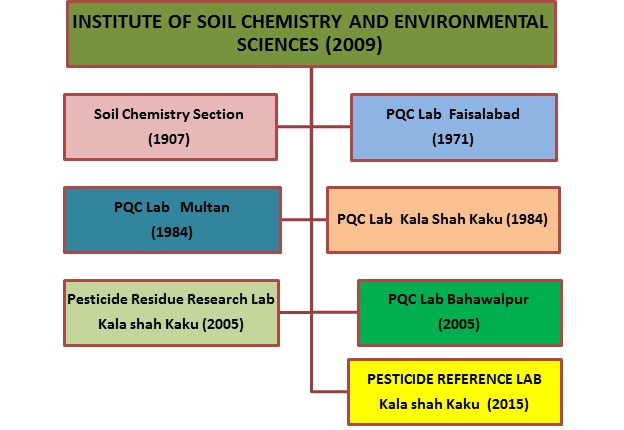Agriculture in Pakistan is threatened by various challenges like expanding population, increased urbanization, constrained water assets, low productivity, and poor base of innovation, global warming and climate change. In addition to being a treasure of nature, soils are an essential resource for human societies. We depend on soils for our food, and for the many ecosystem services they provide. We depend on soils, but we continue to degrade this non-renewable resource and soil is still a second tier environmental priority. Pakistan has its own challenges like nutrient depletion, salinization and erosion which are so closely related to food security. The trend of soil degradation must be reversed through sustainable soil management practices. Pakistan has diverse agro-ecological conditions due to the variation in crops, climate, edaphic conditions, hydrological systems and terrain conditions. Advance our understanding of biogeochemical cycles of carbon and nutrient elements in soil, providing important insight into regional and global element cycles which provide the basis for sustainable soil and land use management. ISCES is dealing with soils as a natural resource on the surface of the earth including soil formation, classification, physical, chemical, biological, and fertility properties of soils; and these properties in relation to the use and management of the soils. Since, our soils are mostly deficient in N and P whereas the deficiency of K and micronutrients especially Zn and boron (B) has now established in many areas. The application of these nutrients and adoption of new technologies are essential for successful farming without damaging the environment and to combat with the hiking prices of fertilizer. ISCES also deals with plant protection measures which are also significant for optimum crop production. The use of pesticides has tremendously increased during the last decades therefore the availability of adulteration free pesticides is essential to reduce the quantity of pesticide use in the country and to save the cost on its import. To address these problems effectively, the Institute of Soil Chemistry and Environmental Sciences was established in 2009 by bringing Soil Chemistry Section (established in 1907), Pesticide Quality Control Labs., Faisalabad, Kala Shah Kaku, Multan and Bahawalpur (established in 1971, 1985,1985 and 2005 respectively) and Pesticide Residue Research Lab Kala Shah Kaku (established in 2005) under one umbrella. The objectives of the Institute are to study the effects of chemical fertilizers on soil properties, use of macro and micro nutrients for crops, vegetables and fruits, monitoring environmental pollution by agricultural inputs, safe use of domestic and industrial wastewater for agriculture, pesticide quality control and pesticides residue research.

Vision
Assessing and monitoring of the environmental impact of fertilizers use in agriculture and sewage/industrial effluent irrigation on soil /plant health and environment. To execute research to increase crop yields per unit area through economical and judicious use of available resources. Improvement of pesticide quality control analytical services in Punjab. Monitoring of pesticides residues in crops, fruits, vegetables and other agricultural commodities. Strengthening of pesticide residue assessment services to stakeholders and ISO 17025 accreditation of laboratories.
Mission
To conduct research on plant nutrition; fertilizer management; soil fertility; assessment of environmental impact of fertilizers use in agriculture; crop residue and farm waste management; diagnosis of macro and micronutrients deficiencies in major crops, vegetables, fruits and their remedies; Monitoring the impact of sewage/industrial effluent irrigation on soil /plant health and environment; efficient quality control of pesticides and monitoring of pesticides residues in crops, fruits, vegetables and food chain.
Objectives
Soil Chemistry Section, Faisalabad
- Chemical fertilizers, their behavior and effects on soil properties
- Diagnosis of nutrients deficiencies in soil and their management for crop production
- To increase the fertilizer use efficiency
- Safe use of domestic and industrial wastes for agriculture
- integrated use of fertilizers and organic sources for crop production
- Study of nutrient dynamics in soil
- Use of macro and micronutrients for high yield and quality of crops, vegetables and fruits
Pesticide Quality Control Laboratories (Faisalabad, Multan, Bahawalpur and Kala Shah Kaku)
- Testing of pesticides for quality control in the Punjab (under section 17 of APO, 1971)
- Provision of pesticide analytical services to the purchaser of pesticides (under section 20 of APO, 1971)
- To provide the facility to the appellant for retesting of their unfit pesticide samples in Punjab (under section 18 of APO, 1971)
- Research related to pesticide use and quality issues
Pesticide Residues Laboratory, Kala Shah Kaku
- To assess pesticide residues in food, fruit, vegetables, other field crops and agricultural commodities
- Market survey to monitor the pesticide residues in fruits, vegetables and other commodities
- To provide pesticide residue assessment service to the stakeholders (trade, industry, importer, exporter etc.)
- To determine the withholding period (pre harvest interval) for different pesticides in crops, fruit and vegetables
- To study the biodegradation of pesticides in soil and environment
Pesticide Reference Laboratory, Kala Shah Kaku
- Reanalysis of appeal/disputed cases of pesticides samples throughout the Punjab marked by the Additional Secretary (Task Force)
- Analytical services for the analysis of pesticides and to effectively contribute in pesticides anti adulteration campaign in Punjab
- Regulatory services for the provision Quality Pesticide
- Maintaining International Quality standards for testing service to meet complete customer satisfaction after accredited for IS017025:2005
